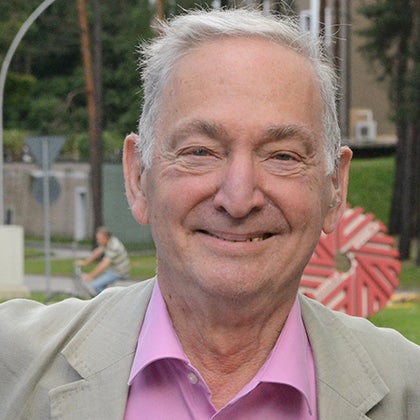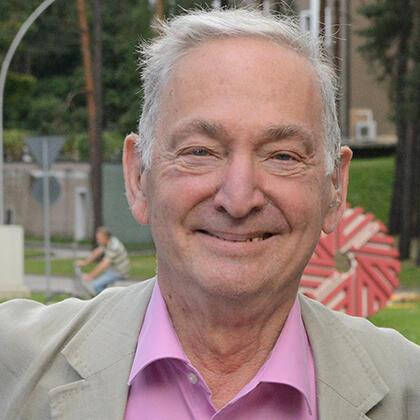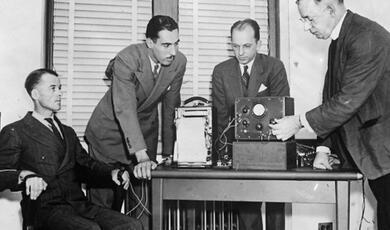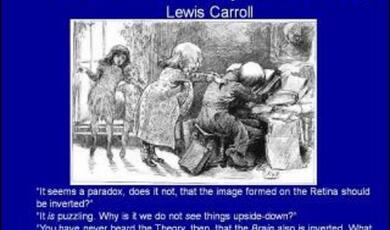Assessing the Three New Science & Society Commissions
Share
- Details
- Transcript
- Audio
- Downloads
- Extra Reading
Download Transcript
Assessing the Three New Science & Society Commissions
Co-sponsored by Gresham College (Joint Professors of Physic: Professor Steven Rose & Professor Hilary Rose) and the Governance & Science Group (Chair: Dr Jerry Ravetz).
This conference is the first of a collaborative series of such which are intended to make concrete and practical the discussion of "genetics and society", the brief of the current Gresham Chair of Physic. 'Science & Governance' has become a Europe-wide issue for policy debate. It focuses attention on the crucial issue of how we to rebuild trust between 'science' and 'society'.
In this country, a legitimacy crisis has been driven by public distrust and scientific controversy over biotechnological developments. In response, the UK government has established innovative bodies to advise on three controversial areas.
Since their inception during the past year, these bodies are still feeling their way and developing their agendas. They are the:
Agriculture and Environment Biotechnology Commission, the Food Standards Agency, and the Human Genetics Advisory Commission whose brief is to stimulate wider audience participation
This conference aims to create a reflective scrutiny of their work, in relation to the issues which motivated their establishment. It aims to involve their members and other interested individuals & groups. The conference will analyse the three bodies as experiments in science & governance, by considering five sub-themes:
Aims: What aims are being pursued through these advisory bodies? How do different aims arise within each one? How do these relate to the government's aims? Expertise: How is expertise being broadened through their composition and remit? How is the specialist/lay distinction being blurred? Debate: How do they take up issues arising in public debate, scientific controversy and other advisory committees? Accountability: How does their work enhance public accountability for the value-frameworks which underlie government policy? Technical/social: What models of science and technology are being promoted or challenged, explicitly or implicitly? How is the technical/social distinction being blurred?
Report on the day. Speakers and discussants:
(1) Overview Professor Robin Grove-White (University of Lancaster and Chair of Greenpeace UK) (2) AEBC Julie Hill (Deputy Chair AEBC and Green Alliance) Discussant Dr Les Levidov (Open University) (3) FSA Sir John Krebs (Chair Food Standards Agency)Discussant Eileen Rubery (Judge Institute, Cambridge University) (4) Professor Alexander McCall Smith (Deputy Chair Human Genetics Commission) Discussant Dr Angus Clarke (University of Cardiff) (5)Professor Derek Burke (Adviser to Parliamentary Office of Science and Technology) Discussant Dr Jerry Ravtez (Governance and Science Group)
The participation at this one day meeting was highly 'expert' but in the new sense of the conference theme itself. So we had, taking the example of food safety, the chair of the Food Standards Agency Sir John Krebs, the supermarkets Tesco and Sainsbury's plus their most distinguished NGO and academic critics. The same was true for the other two: agriculture and biotech, and for human genetics.
There was a widely shared understanding that we were in a new situation concerning the structures that provide advice to government on issues concerning science and technology.
Following a mixture of disasters and crises in public confidence, from nuclear pollution to BSE/CJD and GM foods it is clear that issues of the environment and technology raise issues that can no longer be left to the traditional mechanisms of expert scientific advice given behind closed doors. Similarly, the rapid developments of techniques and claims in human genetics raise great anxieties. While biomedicine has up to now been more trusted than the science and technology that impinges on food and the environment, this is increasingly under question.
In the aftermath of Alder Hay, Bristol and Shipman even biomedical research has experienced a loss of trust in experts and the regulatory authorities. Although the formal status and powers of the Food Standards Agency is very different from that the other two Commissions, the three new bodies are required to consult one another and see themselves as part of a wider innovation. It was clear that they welcomed the chance to compare experiences and certainly the day saw some interesting differences and commonalities.
Just how can 'engagement with the public' be developed by the new bodies and just who is that 'public' was one such hard question. Robin Grove-White set the framework for the day with a reminder of what is still to be achieved in the work of the Commissions.? In spite of all their good efforts and good intentions, they are largely operating within an implicit framework inherited from the past. Thus, it is still assumed that each innovation is good unless proved otherwise; criticism must be of each one, not on the general problems.
There is no way to manage the critics' focus on harms that are not yet known. The social scientists' insights about the complexity of these problems are heard, but are then suppressed in the drive for consensus with the traditional natural scientists. Yet it is the 'unknown unknowns' that are the focus of loss of trust; and attempts to restore that trust with the old assumptions do not have a bright prospect.
In the discussion, it was observed that the world of affairs runs on measurements of quality of every sort. Could there be some way to make 'the intangible tangible'. Also, Grove-White's criticisms apply equally well to the problems of protecting integrity among humans as much as in nature. Could there be a unity of effort among those concerned with one or another of these issues?
Julie Hill described the work of the Agriculture and Environment Biotechnology Commission, as an example of a new style of advisory process. Its twenty members are drawn from the widest possible variety of backgrounds, and they serve as individuals, not as mandated delegates. The questions addressed by the Commission are broad, including ethics and social acceptability. They search for gaps in the regulatory system, and advise on the improvement of regulations.
here are several working groups, whose topics range from the current issues of GM agriculture, through animal husbandry, over to horizon-scanning. The Committee works in public, and engages with the public, as much as possible. And it increasingly puts resources into reflecting on its role, achievements and problems.
Her discussant, Les Levidow, reminded us of the drastic change in the past few years; in the policy domain, science now offers 'soft facts', where there is no simple certainty and no clear separation of facts from values. As a result of this new situation, and the BSE crisis, government has lost control of the agenda of science-related policy. Whether the new commissions will help it regain control, remains to be seen.
Sir John Krebs gave a vision of a radically new approach to the use of science in the management of risks. The Food Standards Agency is proactive, precautionary and open to the public.
It works in a world where scientific uncertainty and a multiplicity of perspectives are the rule. The Agency investigates possible risks which other bodies have discounted; the most recent being the problem of dioxin contamination of cow's milk in locations near to the foot-and-mouth pyres. The old ideal of reliable knowledge is replaced by 'socially robust' knowledge. Science is less a set of facts than a way of knowing; and it is hoped that the Nuffield AS syllabus on 'Science and Public Understanding' will lead the way to a broader understanding.
In her commentary, Eileen Rubery emphasised the need for a new understanding among scientists and civil servants, who have been conditioned to deny emotions and values. In the subsequent discussion, Sir John said that invitations were now going out to organisations promoting organic food, to apply for research grants. A question was raised about the role of the FSA in combating the rise in obesity; the reply was that there is a real clash of interest here between a section of the food industry, and public health.
Alexander McCall-Smith focussed on how the Human Genetics Commission interpreted its mandate. Do we engage in hostile debate or do we keep our powder dry? Unlike media accounts the HGC was an advisory not a regulatory body. He saw the public engagement meetings as succesful. In the light of public concern the HGC had advised the government to set a two-year moratorium on genetic tests for insurance.
The HGC had also raised concerns about the DNA profiles of innocent people being left on the crime database. As discussant Angus Clarke welcomed the improved terms of reference for the HGC. He went on to raise the issue of complexity. As genetics enters medical practice more widely there was great difficulty in defending a patient centred approach which was sensitive to intangibles against the natural science model of evidence based medicine. He pointed to other difficulties such as informed consent in genetics, the new culture of tentative pregnancy and pharmacogenetics.
In his summary of the conference, Derek Burke reviewed progress towards transparency and openness in science advice. The earliest efforts, as the Committee on Novel Foods and Processes, were quite restricted in their remit; thus they could not comment on the nutritional aspects of mixing sugar in a bran preparation.
But things have changed enormously, following the crises over GM foods and BSE? The new commissions might be thought of as the 'long grass' into which an urgent problem was kicked. But if they fail to restore trust, there is no 'Plan B'. They are working inside a system in which power rules. They are dealing with power, and so their task is to be as radical as possible without upsetting the established interests unduly.
In the discussion, the conference was reminded of the enormous powers now being unleashed by scientific developments; behaviour modification by neuro-chemical means is an example. Commissions like our three must increase their commitment to scanning the horizon for such possibilities, lest it be too late to control them when they appear.
© Hilary Rose, Jerry Ravetz, Steven Rose
This event was on Sat, 06 Jul 2002
Support Gresham
Gresham College has offered an outstanding education to the public free of charge for over 400 years. Today, Gresham plays an important role in fostering a love of learning and a greater understanding of ourselves and the world around us. Your donation will help to widen our reach and to broaden our audience, allowing more people to benefit from a high-quality education from some of the brightest minds.


 Login
Login











